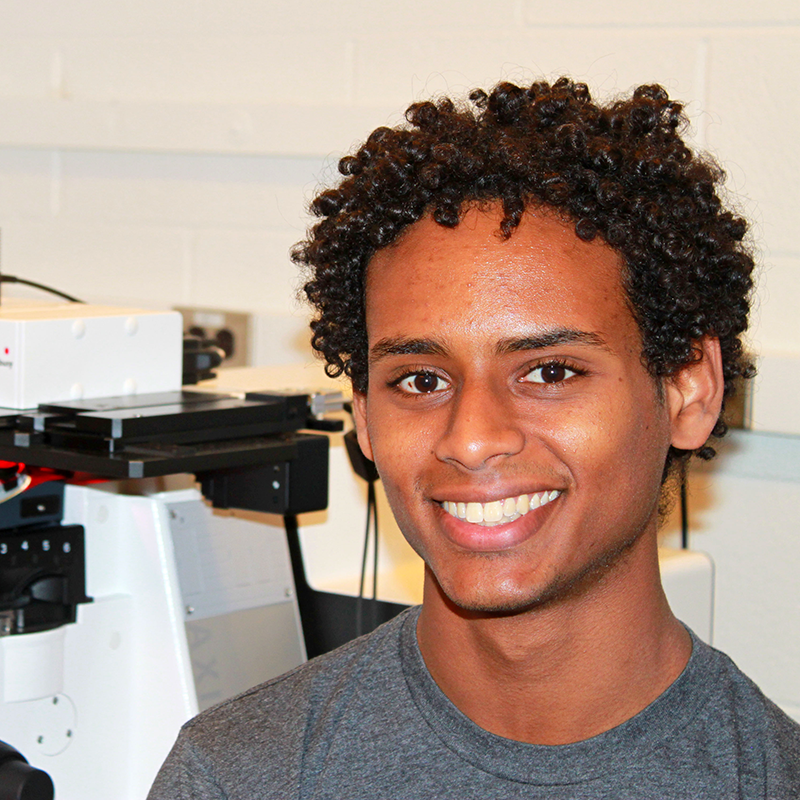
As we get older and have more power, I don’t want our generation to lose what we currently have right now: this feeling that we can change the world.
Aaman Mengis (’18 mechanical engineering) always knew that he would follow in his parents’ footsteps into engineering. But it was when he competed in a high school robotics competition that he realized he wanted to be a mechanical engineer.
Since then, Mengis moved forward to make his mark at the A. James Clark School of Engineering as an awardee of the selective Banneker/Key Scholarship and a member of the Quality Enhancement Systems and Teams (QUEST) honors program.
Now a graduating senior, Mengis notes that the classes that resonated with him the most integrated real-world application with course material. His favorite class, he says, is ENME489Y: Remote Sensing, taught by Lecturer Steve Mitchell, thanks to its innovative technologies and his professor’s engaging teaching style.
“Remote Sensing has had a large impact on my Clark School experience,” says Mengis. “Although I already had enough technical electives to graduate, I couldn't pass up the opportunity to learn about the emerging technology of LiDAR.”
LiDAR, or Light Detection and Ranging, systems use light to take measurements by sending and receiving lasers at very fast speeds to determine the distance of an object. With enough laser points and measurements, objects, rooms, and even a forest can be mapped.
Mangis adds that the class has been such a good experience largely because of Mitchell, who consistently ties in real-world application, brings in guest lecturers, and allows students to directly engage with advanced technology.
In fact, Remote Sensing has been such an impactful course that Mengis decided to take his lessons outside of the classroom.
“I love to go caving,” says Mengis. “My friend and classmate Sam Lewando and I are potentially using the LiDAR system we got from Dr. Mitchell to map a cave. It’s a mixture of my hobbies and what I would love to do for a living, and being able to merge them together makes me so happy.”
When he’s not in class or exploring caves, Mengis can be found around campus or at College Park hot spots performing stand-up comedy as a member of The Bureau, an improvisation and sketch comedy club here at the University of Maryland. Since engineering has such a demanding workload, it is important to Mengis to have a stress reliever that he is passionate about.
Megnis also identifies his Banneker/Key Scholarship, Maryland's most prestigious scholarship, as a stress reliever that has carried him through his entire academic career.
“The freedom it provided me was huge; it really shaped my whole Maryland experience. I probably would have been working the majority of my time at a part-time job or working during the summers to help pay for my education. Something like the map caving and all my other projects have been dependent on the fact that I have a scholarship; otherwise, I wouldn’t have had the capacity to do it at all.”
His greatest motivator to do well in school has been his parents, both electrical engineers and alumni of the University of the District of Columbia, who emigrated from Eritrea to the United States to escape the fall out of the Eritrean–Ethiopian War.
“Knowing that they were starting a new life, that they didn’t know anyone when they came here to a whole new world, and knowing that I came from them is very humbling,” says Mengis. “The challenges that they struggled with make my obstacles seem tiny in comparison.”
Mengis also notes that their experience has allowed him to recognize the privilege that education has given him, and that it is not to be taken for granted.
“We’re the first generation to really understand the social and sustainable impact of all the work that we do. You have agency to change things. As we get older and have more power, I don’t want our generation to lose what we currently have right now: this feeling that we can change the world. When we’re the older generations, we have to remember to listen to the younger people that were once us.”
Top